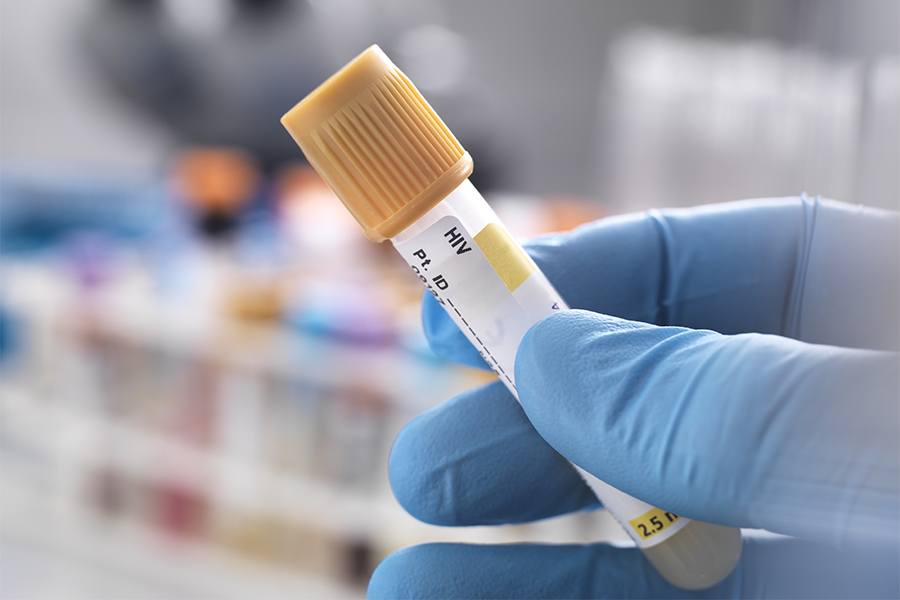The Pandemic Could Result in a Surge of HIV Infections in Boston
Public health experts are worried about a lack of access to resources.

Photo via Getty Images
The spinoff public health crises that will arise from the COVID-19 pandemic and subsequent lockdown are likely to reverberate for generations, but an immediate and growing concern to some Boston infectious disease experts is an expected surge in HIV infections.
Because the lockdown rapidly changed the way we interact with each other and address our personal healthcare, people living with HIV were suddenly faced with life-or-death decisions. Pre-lockdown, there were a variety of ways to get treatment or preventative care. But once hospitals became COVID wards and leaving home became a deadly game, HIV patients and those at risk—especially intravenous drug users—were thrust into dangerous and potentially deadly situations.
“Systems weren’t in place to treat people. That abrupt service disruption has been detrimental,” says Dr. Bisola Ojikutu, a physician and infectious disease expert at Massachusetts General Hospital. “Those in sex work, the homeless—all of the services that would keep them safe were essentially gone. We have this very fragile system. When it was disrupted, the patient felt an intense sense of instability.”
Public health officials are expecting a surge in HIV infections tied to the lockdowns as many patients have been unable or unwilling to take steps to get medications. Officials are also concerned about increased needle sharing during lockdowns, as well as more unprotected sex and decreased availability of prophylactic drugs.
“We’re all concerned we’re going to see a rise in HIV infections,” Ojikutu says. “We need to act now.”
Other city doctors have similar fears. Dr. Chih Chao (Justin) Yang, medical director for Urgent Care and Occupational Health at Manet Community Health Center in Quincy and Taunton, says his HIV patients and those with drug and alcohol use issues are at an increased risk because of the lockdown. Yang said Manet has already seen a “significant increase” in overdoses as well as a high rate of relapse among patients with substance use disorders, including many who are returning to or experimenting with intravenous drug use.
“We definitely see high risk people engaging in high risk activity,” Dr. Yang tells Boston. “The majority of my patients that are on substance abuse treatment programs have relapsed. A portion has told me they have used IV drugs.”
With the surge in relapses comes a hike in patients failing to report for appointments with doctors. Many are fearful of COVID-19 at hospitals and medical centers, so they are not showing up for routine testing or to pick up their meds. Others are winding up in prison, where they face mandatory testing. Some return from the streets post-prison and show up at Manet where they test positive for HIV, hepatitis, and other diseases.
“Many are incarcerated and they test positive,” Yang says. “Overall, because of the loss of follow up, the risk of exposure is definitely more increased. We tell them they need to be tested, but some won’t show up because they’re too afraid.”
At the Community Research Initiative, a Boston non-profit that helps HIV positive patients obtain medication and pay for health care costs, there is a concern that clients in lockdown are not getting their normal meds, including prophylactic drugs that reduce or eliminate spread after exposure. As a preemptive measure, CRI has cut red tape on coverage and prescription access, made telehealth easier, extended coverage for those who can’t pay, and made it easier for patients to fill prescriptions for longer periods of time.
It’s all geared toward stemming an HIV outbreak on the heels of the COVID-19 surge and making sure that patients living with HIV have access to treatment, despite the pandemic.
“I’m hopeful this will get better,” Dr. Yang says. “But my concern is with the next surge, particularly with the homeless. They have a lot of risk of exposure. It’s concerning that if we are met with a surge this fall, that we will start going back that way again.”
Dr. Ojikutu adds: “We’re not able to do the outreach we would normally do. We’re not doing the HIV testing we’d be doing for everybody.”
“People are starting to re-engage,” he continues. “Now that we’re sort of re-opening, people are going to start resuming their life. We need to reach people who have been exposed.”


